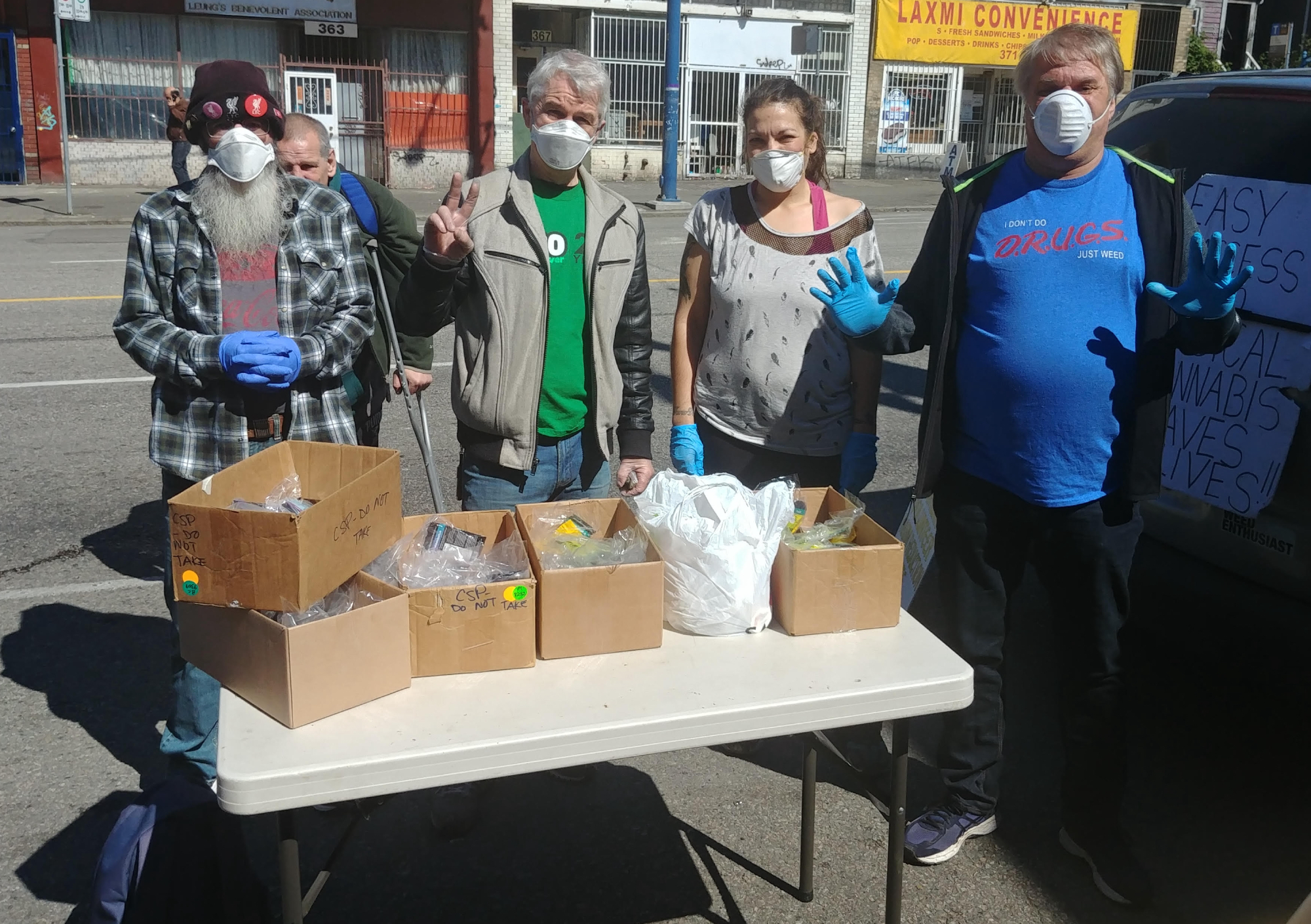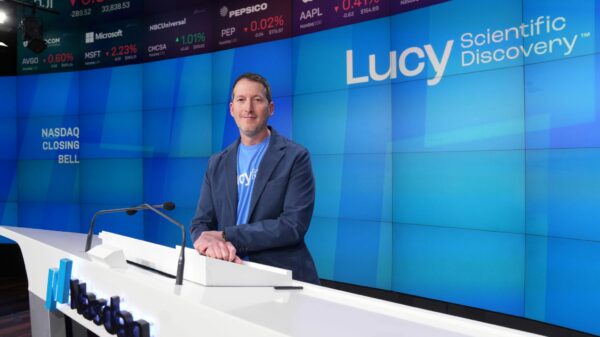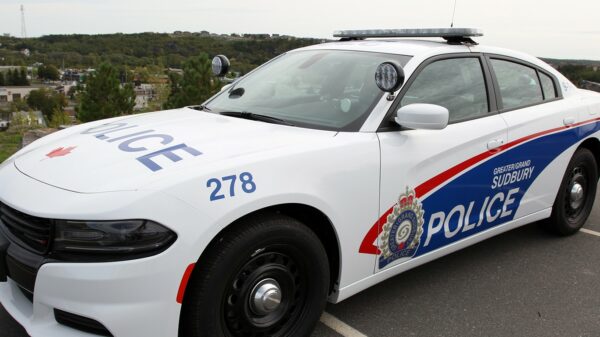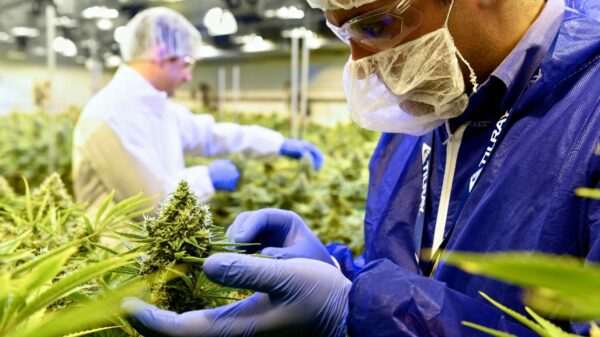Four years ago when cannabis activist Neil Magnuson suggested the City of Vancouver could use weed to save lives during the overdose crisis, he was ignored.
But during the COVID-19 pandemic — which is the second public health crisis to hit the Downtown Eastside (DTES), in addition to the ongoing overdose crisis — Magnuson’s life-saving initiative, the Cannabis Substitution Project, has been deemed an essential service by Vancouver Coastal Health.
The strategy is simple: Hand out free cannabis twice a week, no questions asked.
“They understand that if we were to not help the 250 or so people we help twice a week, that those people would be out in their community trying to solve their issues,” Magnuson said. “And then that’s putting everybody, including themselves, at risk. So we have [Vancouver Coastal Health’s] blessing to continue.”
The Cannabis Substitution Project hands out cannabis care packages every Thursday and Sunday from the Vancouver Area Network of Drug Users’s (VANDU) office, located at 380 East Hastings St. Starting at 11:30 a.m., Magnuson and 15 volunteers hand out packages to a lineup that averages around 250 people. The donated supplies are usually enough to make sure everyone in line gets one care package, and even those who lineup twice often get another, he said.
“We wanted to make it as easy as possible for people to transition off of street drugs. With VANDU, they’re dealing with people that usually have poverty as one of their barriers so we give it away for free,” Magnuson said.
Each care package usually has four to six edibles and around a gram and a half of smokable weed. In the spring, they also give people seeds to grow their own.
‘The Cannabis Act hurt donations more than COVID-19’
While Canadian charities are getting $350 million in federal relief funds because donations have dried up during the pandemic, Magnuson said the Cannabis Substitution Project, which runs on donations but isn’t yet a registered charity, is doing alright.
Actually, the Cannabis Act hurt them more than COVID-19, he said.
“The Cannabis Act impacted us with the Community Safety Unit going around and shutting down dispensaries. Two of our main donators were shut down by them and they’re no longer able to contribute to us,” he said.
The CSU works to protect the financial interests of the regulated market, which doesn’t sell high-dose edibles or reasonably-priced products, Magnuson said.
In comparison, the pandemic has limited donations from one donor, who can’t deliver flower from Kelowna right now, and kept one volunteer, who is caring for an immunocompromised person, at home. Another donor was recently robbed and can’t donate capsules for the next couple months, but that is unrelated to COVID-19, Magnuson said.
Volunteers wear masks and gloves when handing out care packages, and have set up markers to space everyone two metres apart while in the line. In the early days, Magnuson said the lineup was a great place to educate people about how to stay safe during the pandemic, but these days that information has saturated the neighbourhood and everyone’s caught-up.

People line up for the Cannabis Substitution Project on the Downtown Eastside in April, being mindful to keep two metres between them. Submitted photo
Cannabis considered a life-saving harm reduction tool
Magnuson says he’s seen firsthand how effective cannabis edibles are as a harm reduction tool.
He’s been working on the DTES since 2004 when he opened the city’s second dispensary, The Vancouver School of Drug War History and Organic Cultivation, located at East Hastings and Main Street. Staff at the Herb School quickly learned that the brownies and cakes they sold were effective tools to help people experiencing withdrawal symptoms, and also effective in replacing whatever people were experiencing withdrawal from, Magnuson said.
Read more: Cannabis is the overdose prevention tool we don’t use: symposium
People living on the DTES can be living with mental and physical health issues, poverty, stigma, racism, and almost always trauma. Cannabis can be used to improve appetite, alleviate arthritis symptoms or even just help someone enjoy a bit of euphoria, Magnuson said. Though people who self-medicate with cannabis rarely feel euphoria, and instead use weed to function normally, he added.
When people have substance dependency they’re dealing with more than just a drug with inherently addictive properties; they’re dealing with underlying issues and are using drugs as a coping mechanism, he said.
But in the summer of 2015, the city banned the sale of edibles. Then in the following spring, it declared a public health emergency over the overdose crisis.
Magnuson knew weed could help mitigate the cost of the overdose crisis, so he went to VANDU with the idea of handing out cannabis as a harm reduction tool. With the board’s unanimous support, he went to city hall. When he got there with his proposal, however, Magnuson said councillors listened but then didn’t respond with any support or acknowledgement.
Read more: Daily cannabis use could help battle overdose crisis: study

Contents of an April care package. Submitted photo
“My response was, ‘Well, we’re just going to give it away for free then.’ And that’s what we’ve been doing ever since,” he said.
Using the connections he had from his three-and-a-half years as a dispensary owner, he got enough donations to set up a table at VANDU and hand out care packages. Then he spent a week getting more donations, and handed them out again, and again, until one Saturday when there was a lineup of people waiting for care packages, with a handful of people offering to help out.
Donations ran every Saturday for a full year until the lineups got too big, so they started holding it twice a week.
Originally the Cannabis Substitution Project focused on edibles because edibles allow people to self-medicate to higher doses, Magnuson said. But when he handed out some joints he had, “it became pretty clear that joints were also of value to people as they bridge the time it takes for the edibles to kick in.”
Read more: Founder of raided Victoria dispensary calls legal system ‘prohibition 2.0’
Project grows into Serious Hope Society
To expand the initiative, Magnuson said he recently formed the Serious Hope Society, which will house the Cannabis Substitution Project. So far, the society has a board of directors and an advisory board and is working on finding a storefront to rent as a permanent location on the DTES.
The store would sell low-cost cannabis with their most potent, high-end products selling for just $8 per gram. The Cannabis Substitution Project would be run all day every day from that location for anyone who financially qualifies, which includes everyone who currently accesses the service. The store would also allow them to customize the care packages they hand out to better suit people’s needs, Magnuson said.
The society is also working towards registering as a charity, which would mean donations could be tax-deductible. For now, Magnuson said it’s his full-time job to secure ongoing donations, and asks that anyone interested in donating contact him through his or the Cannabis Substitution Project’s Facebook page.

The Serious Hope Society is looking for a permanent storefront where it can sell low barrier cannabis and host the Cannabis Substitution Project twice a week. Submitted photo
More donations are needed, he stressed, because right now a care package is unlikely to get someone through half of the week.
“We would really like to have the government help us because what we’re doing is what the government’s should be doing or at least helping people do. The people are in serious need and the government is who should be helping the people that are in serious need. It shouldn’t be just left up to our community to step up and do that.”
Cannabis Substitution Projects are also run out of Victoria and Halifax, but the East Coast location has temporarily closed during the pandemic.
Top image: The Cannabis Substitution Project team hands out care packages in April. Neil Magnuson is pictured centre, in green. Submitted photo
michelle@mugglehead.com
@missmishelle















sarah
April 29, 2020 at 8:17 pm
What an amazing thing you’re doing! Harm reduction all the way!
How would I help volunteer?
Michelle Gamage
April 30, 2020 at 12:18 pm
Hi Sarah,
Neil Magnuson said anyone interesting in helping could contact him through his Facebook page, or through the Cannabis Substitution Project’s Facebook page.
Cheers,